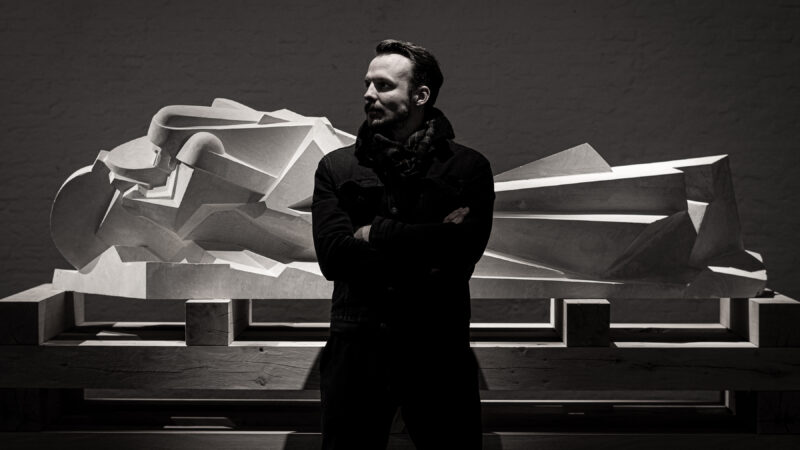Madness and Spectacle: The Yellow Vest Suite (Magazine Excerpt)
At the time my personal motivation in doing a whole suite of works was the aesthetic superseding the political. I was captivated by the sensuous images of darkness and colour shades that I tried to capture in these paintings and drawings. Multitudes of people wearing a loose uniform of greenish yellow starkly contrasted with the burning embers of street fires, and thick black smoke from various car chemicals and building materials being immolated, darkening the sky. So many monuments to France’s history are contrasted by a new revolutionary fervour. I was attempting to create a sort of protest impressionism, colour swatches in the darkness of smoke and the light of fire.
But perhaps this is too a sort of romanticism, an aesthetic expression of a yearning for political possibilities outside of the confines of Globo-liberalism, because the political-aesthetic picture of current times produced by Globo-liberalism is so bland, Kitschy, its regime-approved protest art so vulgar and dehumanising, from flat design humans to Banksy. In other words, it sells you empty left-liberal sentimentalism. But my paintings are not meant to create a new counter political-aesthetic. In hindsight, these works are merely cartographic, depictions of a historical moment done as faithfully as I could. Art as a dramatic record of events, a window into vivid scenes that didn’t quite seem real.
Since the petering out of the Yellow Vests, and the periodic riots and public demonstrations in France, over everything from climate change to changes in pension law, there seems to be a jadedness and morose character to the “active politics” of the French. Each one seems to devolve into a public dance party, a more spectacle-driven and violent form of the same cynical and exhausted symbolic politics that lurches forth in most of the Western world. The same people smashing windows and lighting cars on fire went right back and voted for Macron again.
This calls into question the nature of a true syncretism between fringe left and right political coalitions that meet in the middle of society through public political rituals of demonstration and protest. Perhaps it is true that these sorts of protests and public events are merely vanities, and real politics in globalised liberalism is far away and above the direct means of resistance ordinary citizens have. In other words, managerialism, more than tyranny and ideological millenarianism could ever dream of, did away with the concerns and whims of the crowd.
But in the end, the Yellow Vests provided striking images, and for a time, provided an aesthetic politics which could provide a template for further populist movements which cross-cuts ideological and cultural boundaries. The Yellow Vests were very much of the times we are living in now, because it is the image, the aesthetic more than anything, especially in the online world, which informs and contorts the political.

This is an excerpt from “Blast!”. To continue reading, visit The Mallard’s Shopify.













The Surrogacy Question
Are we owed a child? Is it a human right to be able to have one?
In a recent Instagram piece, Olympic diver Tom Daley posted a picture of himself, his husband Dustin and their toddler son with baby Phoenix Rose, the new addition to their family. It’s a variation of the same family picture we’ve seen thousands of times. The comments were full of excited congratulations from friends and fans alike. Again, something we’ve seen thousands of times.
What some pointed out however, was the lack of the person who had given birth to the little one: the surrogate.
Such images are common online. New parents show off their new child, but they do not show the surrogate. Some may mention her, but she is now shown. In a move that irks many, the parent or parents may sit in the hospital bed, holding the baby as though they have given birth to it.
It begs the question: is surrogacy acceptable?
What is surrogacy?
Surrogacy is the act of a woman carrying and birthing a child for another person or couple. There are two types of surrogacy:
Gestational Surrogacy: the surrogate is biologically unrelated to the baby. The eggs come from the intended adopted mother or a donor.
Traditional Surrogacy: the surrogate’s eggs are used. She is biologically related to the baby.
There are two types of surrogate services. One is altruistic, in which the surrogate is doing this as a favour and without payment. Commercial surrogacy allows payment and it can include medical fees or even more than that.
Who uses it?
Surrogacy can be used by heterosexual couples, same-sex couples and single people. Those who use surrogacy may do it for a variety of reasons. Reasons include:
● Unable to carry a child
● Single person
● Same-sex couple
● Unable to adopt
● Older person
● Does not want to be pregnant
● Worry about pregnancy
● Medically required
Celebrities that have used surrogates:
Heterosexual Couples:
● Grey’s Anatomy star Ellen Pompeo and husband Chris Ivery
● Jonas Brothers member Nick Jonas and actress Priyanka Chopra
● Rapper Kanye West and reality star Kim Kardashian
● Actor Matthew Broderick and actress Sarah Jessica Parker
● Fast and Furious star Jordana Brewster and producer Andrew Form
● Frasier star Kelsey Grammer and reality star Camille
● Actor Courtney B. Vance and actress Angela Bassett
● Star Wars creator George Lucas and wife Mellody Hobson
● Actress Nicole Kidman and singer Keith Urban
● Actor Robert DeNiro and model Toukie Smith
● Model Tyra Banks and photographer Erik Asla
● Twitter owner Elon Musk and singer Grimes
● Actor Alec Baldwin and yoga instructor Hilaria Baldwin
● Actress Cameron Diaz and singer Benji Madden
LGBT Couples:
● Modern Family star Jesse Tyler Ferguson and husband Justin Mikita
● Actors Neil Patrick Harris and David Burtka
● Singer Elton John and filmmaker David Furnish
● Singer Ricky Martin and artist Jwan Yosef
● Glee creator Ryan Murphy and husband David Miller
● NSYNC singer Lance Bass and husband Michael Turchin
Single Parents:
● Pitch Perfect star Rebel Wilson
● Talk show host Andy Cohen
● Journalist Anderson Cooper
● Actress Lucy Liu
● Blogger Perez Hilton
● Footballer Cristiano Ronaldo
● Singer Michael Jackson
● Actress Amber Heard
What’s the Law?
Laws vary country to country. Altruistic surrogacy is more likely to be legal than paid surrogacy as it’s believed there is less exploitation. Laws may restrict access to non-nationals or non-married straight couples.
UK: Surrogacy is legal in the U.K., but a surrogate is not allowed to be paid beyond reasonable expenses. Contracts are not legally binding. Surrogates are automatically regarded as the legal parent, whether or not she is biologically related to the baby. It is a criminal offence to advertise your search for a surrogate, advertise that you wish to be one, for a third party to receive payment, and to broker a surrogacy agreement. This means commercial surrogacy is banned.
USA: Surrogacy laws vary from state to state. Surrogacy is totally banned in Michigan. Only straight married couples using their own eggs can use surrogacy in Louisiana, but commercial surrogacy is banned. California allows both altruistic and commercial surrogacy to all and allows pre-birth orders to establish legal paternity.
Australia: Altruistic surrogacy is legal across all states and territories.
Canada: Altruistic surrogacy with reasonably paid expenses is allowed everywhere except Quebec, where all surrogacy is banned.
France: Surrogacy is illegal.
India: Surrogacy is legal for married heterosexual Indian couples who meet certain criteria such as age and length of marriage. Certain single women are also permitted to use surrogacy. India previously allowed foreigners to use surrogates. This was limited to straight couples in 2013 before it was banned for all foreigners in 2015. Prior to 2015, India was a hugely popular destination for fertility tourism due to easiness and relative cheapness.
Iran: Surrogacy is totally legal and is a popular destination in the Middle East for heterosexual couples.
Russia: Surrogacy is legal for Russian couples. The lower house of government has passed a bill banning foreign parents from using surrogacy.
Ukraine: Surrogacy is legal for heterosexual married couples. As it’s easy to get and often relatively cheap, Ukraine is a very popular destination for fertility tourism.
Popular destinations for surrogacy include the United States, Ukraine, Colombia, Georgia and Mexico.
Religious Perspectives
Religious views on surrogacy vary even within the same faith. Different denominations have different views on the accessibility of surrogacy and the conditions that merit it.
Catholicism opposes surrogacy and all other types of reproductive assistance. One paragraph of the Catechism of 1992 states: ‘Techniques that entail the dissociation of husband and wife, by the intrusion of a person other than the couple (donation of sperm or ovum, surrogate uterus), are gravely immoral.’ The Church believes that conception cannot and should not be separated from the sexual intercourse between a married, heterosexual couple. As surrogacy uses an outside source, it is deemed immoral by the Catholic Church.
The Church of the Jesus Christ of Latter-day Saints (Mormons) still disapprove of surrogacy and strongly discourage it, but believes it is down to the individual married couple. One of Mitt Romney’s sons has used surrogacy and three have used IVF, both of which the church disagrees with.
The Russian Orthodox Church strongly opposes surrogacy. They will not baptise children born of surrogacy unless the biological parents repent.
Judaism has not got a clear line on surrogacy. The worry is the child would belong to the surrogate mother and as Judaism tends to be matrilineal, it’s an issue if the surrogate is not Jewish. Couples are usually urged to seek the help of their rabbi. Some rabbis and scholars believe it is exploitative. It’s recommended that there’s a list of Jewish surrogates to ensure there are no accidental sibling marriages. Some authorities prefer that the surrogate is not a blood relation of the father and that she is not married.
The views between the two main sects of Islam, Sunni and Shia, vary. Sunni Islam explicitly prohibits surrogacy as it is introducing the sperm of a man who is not married to the surrogate. Islam has very strict views on lineage and blood, hence why adoption in the Western sense is not permitted. Shia Islam generally permits surrogacy, and the Shia nation of Iran is actually one of the leading pioneers in fertility treatment.
Hinduism has not got a particular stance on surrogacy. Whilst there is no prohibition, the use of surrogacy by Hindus is generally quite rare. India was a popular destination for surrogacy for many years before the ban on commercial surrogacy came in, so many surrogate mothers are members of the Hindu faith.
Buddhism has not spoken out about surrogacy, but it’s generally approved of. It can be seen as an act of charity and kindness that gives one good karma.
What is right?
Few issues unite left-leaning feminists and the religious right like surrogacy does. They are united in their condemnation of the practice that they say exploits women, children and the poor. Their reasons may be different but they ultimately join together. To them, and perhaps those who don’t even subscribe to either ideology, surrogacy is wrong.
Surrogacy seems to be everywhere. As stated above, many celebrities seem to be using surrogacy in order to start their own families. The language used when reporting it does nothing to bring attention or praise to the surrogate. One article reported that Paris Hilton ‘gave birth with the help of a surrogate.’ No, Ms. Hilton did not give birth. The surrogate did. Instantly, the non-surrogates are proclaimed to be the parent. Legally that is not always true. Ethically? It’s a bit murky.
The immediate concern is for the surrogates themselves. Long have women wished to be parted from the notion that they are a walking womb, yet the role of surrogate seems to push them into that box. She may be given money and expenses and lavish items, but they are not for her, but for what she can do. The care is ultimately for the baby or babies she is carrying. Her value is what is in her womb.
Surrogacy is not without risks. Pregnancy in itself can be a danger. Pregnancy and childbirth are two very taxing, tiring things that can do a number on one’s mind and body. That is not to say that the end result is not one of joy, but it is not an easy thing to enter into. The surrogate is giving birth to a child that she is biologically attached to but will be given away almost as soon as possible.
There’s also somewhat of an obsession with perfection within surrogacy. Parents want the perfect baby. They’ll refuse a child seen as ‘defective.’ Plans are made so that the baby will look a certain way. Paris Hilton even edited her baby’s fingernails on Instagram. That is not true of all surrogate parents, but your child should not have to be perfect.
She is also bound by agreements. Whilst they are not legally binding in some places, the contracts can reward the prospective parent a lot of power over the woman’s body. It is possible for them to even control any medicine that she needs. In one episode of Chicago Med, a young surrogate comes in and ends up needing to deliver early. She refuses, as the parents won’t accept the baby or pay if she delivers before forty weeks. If the baby is disabled or the wrong gender, then they may even ask for an abortion. The woman is poor and desperate and has agreed to these terms.
This is what it all circles back to: exploitation.
India banned all foreign couples from using surrogacy in the country over concerns about the treatment of surrogates. The Indian surrogates were generally poor women who were desperate to make money for their families. These women, often uneducated and living hand-to-mouth, are giving up so much. Despite getting paid, the expenses often aren’t enough. Most of the money paid by parents goes to agencies, not the surrogate. They are often shafted. They are no given what they are due for the service they are providing. India is known for having crushing poverty so it’s no wonder these women offer themselves.
Surrogacy is not cheap. In the USA, it can cost between $100-200K. That’s not pocket money. That is money that very few people can easily spend. The costs are so astronomical which is why so many go abroad. Some even turn to loans. This means those who pursue surrogacy have means. Contrast this with the surrogate. Surrogates are more often than not much less wealthy than the parents. This creates a case of wealth buying a baby.
Once the pregnancy is done and a baby is born, the woman is disposable. The baby will be given to their new parents immediately and separated from the woman who gave birth to them. That’s hard for a woman who has just given birth- it’s a haze of hormones and feelings. Is there aftercare?
Surrogacy has not been without its scandals and controversies. One popular fertility clinic in Ukraine saw its owner and its head physician locked up for human trafficking. In places where surrogacy is less regulated, there can be cases of abuse that fly freely. It’s not an uncommon connection. Human trafficking is something that horrified any good person. Whilst even critics of surrogacy may not go as far as to compare it to human trafficking, the potential for the two to be linked is great.
Unrestrictive policies allow abuses to happen. One Japanese man gained thirteen children through surrogacy and was given custody of them by courts. The children had been found in Bangkok, attended to by nannies. Commercial surrogacy in Thailand is banned, yet this was allowed to happen.
Thailand was in the spotlight in 2014 regarding a very contentious surrogacy. An Australian man named David Farnell and his wife Wendy went to Thailand and got a gestational surrogate. When it turned out that one of the twins their surrogate Pattaramon Janbua was carrying had Down’s Syndrome, the Farnells told her to abort him. Pattaramon did not wish to and gave birth to both children. The other twin was born healthy and was given to the Farnells. Miscommunication meant that the Farnells went back to Australia with their baby daughter Pipah, whilst Pattarmon kept baby Gammy.
Controversy further arose when it was discovered that Farnell had been convicted for child sexual offences. In the 1990s, Farnell had been jailed for molesting two girls under ten and had further assaulted three women. Thai law said that the birth mother of a child was the mother, yet little Pipah was allowed to go home with this man. The courts eventually ruled that Farnell was not allowed to be alone with Pipah. He would eventually die in 2020.
That is not to say that every parent who has children the traditional way or adopts is perfect. The adoption process has seen its fair share of issues. That being said, adoption does have more restrictions. Adoption can be so strict and time consuming in the US that many go abroad to adopt in places like China.
I cannot begrudge a person or persons for wanting children. It has been the natural order of things since time immemorial. Infertility is a desperately sad thing for those who want to have a family. It circles back to the question of whether a baby is a right or a privilege. Not everyone who uses a surrogate is infertile either. It can come down to simply not wanting to be pregnant.
At the end of the day, somebody has to be pregnant in order to have a child. The question is: who should it be?
Photo Credit.